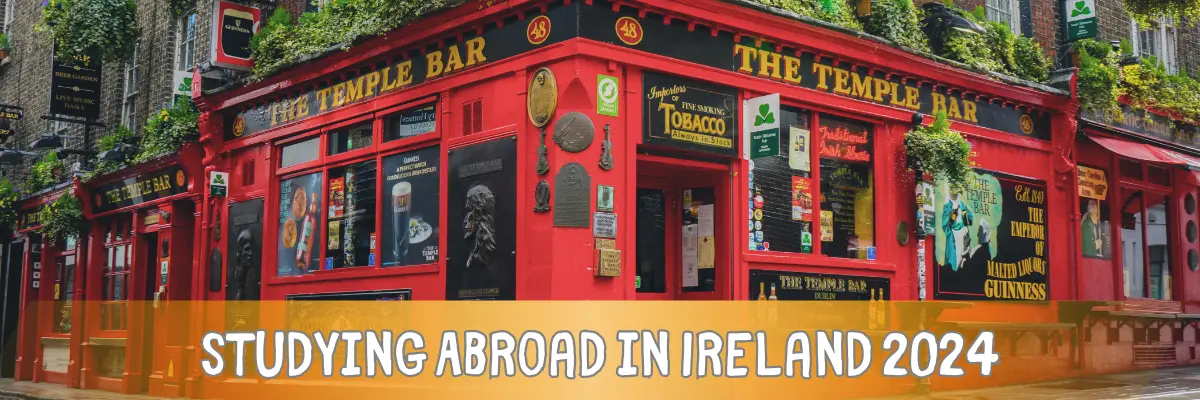11 Apr 2024 | Understanding Eligibility Criteria for Studying in Ireland
0
998
What are the Eligibility Criteria for Study in Ireland?
Ireland, with its rich cultural heritage and world-renowned educational institutions, has emerged as a favored destination for international students seeking quality education. However, before embarking on the journey to study in Ireland, it's crucial to understand the eligibility criteria. This guide will navigate you through the requirements, ensuring a smooth transition to academic pursuits in the Emerald Isle.
Academic Qualifications
To pursue higher education in Ireland, candidates must meet specific academic qualifications. These typically include
Secondary Education: Applicants should have completed their secondary education with satisfactory grades.
Language Proficiency: Proficiency in English is essential. Most universities and colleges accept internationally recognized English language proficiency tests like IELTS or TOEFL.
Specific Course Requirements: Some courses may have additional prerequisites, such as specific subjects studied at the secondary level or prerequisite courses completed at the undergraduate level.
Financial Stability
Sufficient financial resources are necessary to support oneself during the course of study in Ireland. Financial stability can be demonstrated through
Tuition Fees: Applicants must show proof of funds to cover tuition fees for the duration of their chosen program.
Living Expenses: Evidence of financial capability to cover living expenses, including accommodation, food, transportation, and other miscellaneous costs.
Health Insurance: Health insurance coverage is mandatory for international students in Ireland. Adequate health insurance must be arranged before arrival.
Visa and Immigration Requirements
Obtaining the appropriate visa and meeting immigration requirements is paramount for international students planning to study in Ireland.
Student Visa: Applicants must apply for a student visa (usually known as the 'Study Visa' or 'D Visa') before arriving in Ireland.
Documentation: Detailed documentation, including an offer letter from an Irish educational institution, proof of finances, and evidence of accommodation arrangements, is necessary for visa application.
Immigration Clearance: Upon arrival in Ireland, students must register with the Irish Naturalisation and Immigration Service (INIS) and obtain immigration clearance.
Health and Insurance
Health and insurance considerations are crucial aspects of the eligibility criteria. Students must:
Healthcare Coverage: International students must have access to healthcare services while studying in Ireland. This can be through private health insurance or enrollment in the Irish public healthcare system, depending on the duration of stay and nationality.
Travel Insurance: Adequate travel insurance covering medical emergencies, repatriation, and other unforeseen circumstances is recommended.
Age Restrictions: While there is no upper age limit for studying in Ireland, some institutions may have specific age requirements for certain courses or programs. Applicants should check the age criteria specified by the respective educational institutions.
Additional Considerations
In addition to the primary eligibility criteria mentioned above, there are several other factors to consider
Academic References: Some courses may require letters of recommendation or academic references as part of the application process.
Statement of Purpose: A well-crafted statement of purpose outlining the candidate's academic background, career goals, and reasons for choosing Ireland as a study destination can strengthen the application.
Interviews: Depending on the course and institution, applicants may be required to attend interviews as part of the selection process.
Studying in Ireland offers a unique opportunity for international students to experience world-class education in a vibrant and welcoming environment. By understanding and fulfilling the eligibility criteria outlined in this guide, aspiring students can embark on a fulfilling academic journey in the Emerald Isle. Remember, thorough preparation and adherence to requirements are key to realizing your educational aspirations in Ireland.
A journey to study in Ireland opens doors to academic excellence, cultural immersion, and personal growth. Whether you're drawn to the historic universities of Dublin, the picturesque landscapes of Galway, or the innovative institutions of Cork, Ireland offers a diverse range of educational opportunities to suit every ambition. Start your adventure today and unlock the limitless possibilities awaiting you in the land of saints and scholars.
For more assistance, please visit our study abroad consultancy services and explore our wide range of offerings for students interested in studying in the USA, studying in the UK, studying in Canada, studying in Australia, studying in Ireland, and many other countries.
Frequently Asked Questions
1. What are the tuition fees for international students in Ireland?
Tuition fees vary depending on the course, institution, and level of study. On average, undergraduate programs range from €10,000 to €25,000 per year, while postgraduate programs can cost between €10,000 to €35,000 annually. It's essential to check with individual universities for specific fee structures.
2. Are scholarships available for international students in Ireland?
Yes, many universities and organizations in Ireland offer scholarships and financial aid to international students based on academic merit, leadership qualities, and financial need. Applicants are encouraged to explore scholarship opportunities through university websites, government schemes, and international organizations.
3. Can I work part-time while studying in Ireland?
Yes, international students in Ireland are permitted to work part-time during the academic year (up to 20 hours per week) and full-time during scheduled holidays. However, it's important to note that students should prioritize their studies, and work opportunities may be limited depending on visa conditions and course requirements.
4. How do I apply for a student visa to study in Ireland?
To apply for a student visa (D Visa) for Ireland, applicants must first receive an offer of admission from a recognized Irish educational institution. Once accepted, they can apply for a visa through their nearest Irish embassy or consulate. Detailed documentation, including proof of finances, medical insurance, and accommodation arrangements, is required for the visa application.
5. Is it necessary to have health insurance while studying in Ireland?
Yes, health insurance is mandatory for all international students studying in Ireland. Students must either obtain private health insurance coverage or enroll in the Irish public healthcare system, depending on their nationality and duration of stay. Adequate health insurance ensures access to healthcare services and covers medical expenses during the course of study.
6. Can international students stay in Ireland after completing their studies?
Yes, international students who graduate from Irish universities can apply for a 'Third Level Graduate Scheme' permit, which allows them to remain in Ireland for up to two years to seek employment or pursue further studies. Additionally, graduates may be eligible for various work and residency schemes aimed at retaining skilled talent in Ireland's workforce.


